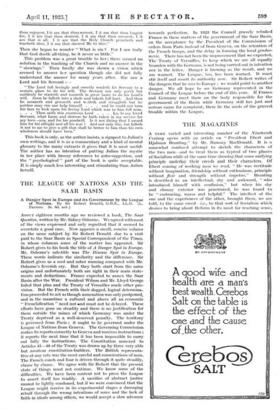THE LEAGUE OF NATIONS AND THE SAAR BASIN
ABOUT eighteen months ago we reviewed a book, The Saar Question, written by Mr. Sidney Osborne. We agreed with most of the views expressed and only regretted that it seemed to overstate a good case. Now appears a small, concise volume on the same subject by Sir Robert Donald, due to a visit paid to the Saar Basin as Special Correspondent of the Times, in whose columns some of the matter has appeared. Sir Robert gives to his book the title of A Danger Spot in Europe. Mr. Osborne's sub-title was The Disease Spot in Europe. These words indicate the similarity and the difference. Sir Robert gives us a cool and sober warning compared with Mr. Osborne's feverish cry. But they both start from the same origins and unfortunately both are right in their main state- ments and deductions. France expected to annex the Saar Basin after the War. President Wilson and Mr. Lloyd George foiled that plan and the Treaty of Versailles made other pro- vision. But the French with their dogged, logical determina- tion proceeded to act as though annexation was only postponed, and in the meantime a cultural and above all an economic " Frenchification " need not and must not be delayed. These efforts have gone on steadily and there is no justification for them outside the mines of which Germany was under the Treaty deprived as a well-deserved penalty. The territory is governed from Paris ; it ought to be governed under the League of Nations from Geneva. The Governing Commission makes its reports correctly to Geneva and receives instructions ; it reports the next time that it has been impossible to carry out fully the instructions. The Constitution annexed to Articles 45-18 of the Treaty was drawn up by three very able but amateur constitution-builders. The British representa- tive at any rate was the most careful and conscientious of men. The French coach and four is driven through it quite steadily, clause by clause. We agree with Sir Robert that the present state of things must not continue. We know some of the difficulties. We have been content not to press the League to assert itself too readily. A sacrifice of abstract justice cannot be lightly condoned, but if we were convinced that the League might receive in its experimental stages a damaging rebuff through the wrong intentions of some and the lack of faith in ideals among others, we would accept a slow advance towards perfection. In 1923 the Council gravely rebuked France in these matters of the government of the Saar Basin, on the acceptance by the President of the Commission of orders from Paris instead of from Geneva, on the retention of the French troops, and the delay in forming the local gendar- merie. There has not been the improvement that we expected. The Treaty of Versailles, to keep which we are all equally bounden with the Germans, is not being carried out in intention nor in the letter. Danger is brewing as the result, and we are warned. The League, too, has been warned. It must stir itself and assert its authority now. Sir Robert writes of the dangers that he sees to Europe ; we would point to another danger. We all hope to see Germany represented in the Council of the League before the end of this year. If France and Germany meet there on the body responsible for the government of the Basin while Germany still has just and serious cause for complaint, there lie the seeds of the gravest trouble within the League.










































 Previous page
Previous page